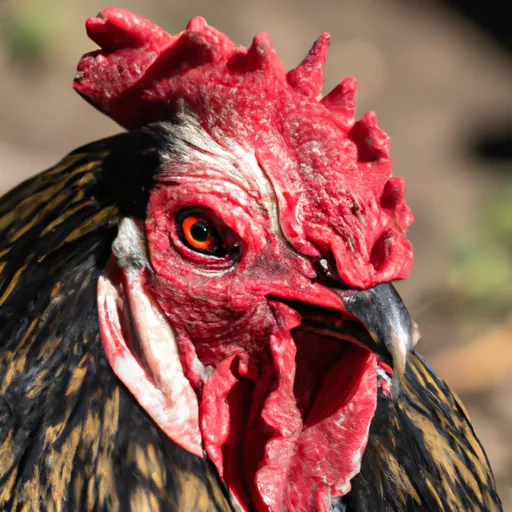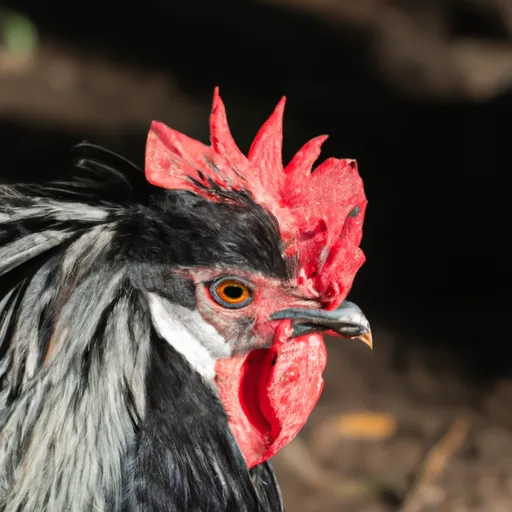Are Ameraucana Roosters Mean?
Curious about the temperament of Ameraucana roosters?
Wondering if they are friendly or mean?
So let's explore the behavior of Ameraucana roosters and answer common questions surrounding their personality, noise level, appearance, and more.
If you're considering adding an Ameraucana rooster to your flock or simply want to learn more about these fascinating birds, you're in the right place!
Let's find out if Ameraucana roosters are as mean as they're sometimes rumored to be.
Are Ameraucana Roosters Mean?
If you're considering raising Ameraucana chickens, one of the questions that might come to mind is whether Ameraucana roosters are mean.
It's natural to be concerned about the temperament of the roosters, as they play a vital role in protecting the flock and maintaining order.
Let's explore the behavior of Ameraucana roosters, factors that affect their aggression, their temperament in general, interactions with other chickens, training, and socialization, and how to manage rooster aggression.
By the end, you should have a better understanding of what to expect and how to effectively handle Ameraucana roosters.
Behavior of Ameraucana Roosters
Ameraucana roosters, like any other rooster breed, tend to exhibit territorial behavior.
They are protective of their hens and their territory, which can sometimes be misinterpreted as aggression.
Roosters have a natural instinct to sound the alarm and defend the flock against predators, making them more vigilant and assertive.
It's important to understand that this protective behavior is normal and necessary for a healthy flock.
Factors that Affect Rooster Aggression
Various factors can influence the aggression levels of Ameraucana roosters. One significant factor is genetics.
Some roosters may inherit more aggressive tendencies from their ancestors, while others may have a calmer disposition.
The environment and social dynamics within the flock can also impact a rooster's behavior.
For example, overcrowding, lack of resources, or the presence of other dominant roosters can trigger increased aggression in Ameraucana roosters.
Aggressive vs. Protective Behavior
It is crucial to distinguish between aggressive behavior and protective behavior in Ameraucana roosters.
Aggressive behavior is often characterized by unprovoked attacks, persistent chasing, or excessive pecking.
This type of behavior may not be suitable for a backyard flock environment, as it can pose a danger to other chickens and even humans.
On the other hand, protective behavior is more focused on keeping the flock safe from potential threats.

This can include warning calls, fluffed feathers, or charging intruders to establish boundaries. Protective behavior is essential for the well-being of the flock and should be encouraged, as long as it remains within reasonable limits.
Ameraucana Rooster Temperament
While individual temperaments may vary, Ameraucana roosters tend to have a relatively calm and friendly disposition compared to some other breeds.
They are known for being docile and tolerant, making them well-suited for backyard flocks.
However, as with any animal, there can always be exceptions to the general temperament. It's important to evaluate each rooster's behavior and take appropriate steps to manage any aggressive tendencies.
Interactions with Other Chickens
The way Ameraucana roosters interact with other chickens can be influenced by several factors, including flock hierarchy, pecking order, and the dynamics between individual birds.
When introducing a new rooster to an established flock, it's common for some level of conflict to occur. This conflict typically resolves itself as the roosters establish their place within the pecking order.
Proper introduction and socialization techniques can help minimize aggression and establish harmony within the flock.
Providing sufficient space, resources, and a structured hierarchy can contribute to a healthier and more peaceful environment for all the chickens, including Ameraucana roosters.
Training and Socialization
Early training and socialization play a crucial role in shaping the behavior of Ameraucana roosters.
By exposing them to different environments, people, and situations at a young age, they can become more adaptable and less likely to exhibit aggressive behavior.
Gentle handling and positive reinforcement can also help foster trust and cooperation between the rooster and its caretaker.
Consistency and patience are key when training Ameraucana roosters.
By using positive reinforcement techniques, such as rewards for desired behaviors, you can encourage good behavior and discourage aggression.
With regular training sessions, Ameraucana roosters can learn to respond to commands and become more manageable overall.
Managing Rooster Aggression
If you encounter excessive aggression or behavior that poses a threat to the flock or yourself, it's important to take immediate action.
Isolating the aggressive rooster from the flock for a brief period can help establish boundaries and allow the rooster to calm down.
Introducing diversionary tactics, such as offering new food or toys, can help redirect their attention and decrease aggression.
In extreme cases where the rooster's aggression persists despite training and management efforts, finding a suitable new home for the rooster might be the best solution.
It's essential to prioritize the safety and well-being of the entire flock when managing rooster aggression.
The Importance of Proper Handling
Proper handling is crucial when it comes to managing the behavior of Ameraucana roosters. Rough or aggressive handling can trigger defensive reactions and escalate undesirable behavior.
By using gentle and calm techniques during interactions, you can establish trust and maintain a positive relationship with your rooster.
Approach your rooster confidently but calmly, avoiding any sudden or threatening gestures.
Avoid cornering or startling the rooster, as this can trigger stress responses and potentially aggressive behavior.
By respecting their personal space and providing positive reinforcement, you can foster a respectful and cooperative relationship with your Ameraucana rooster.
Common Misconceptions about Ameraucana Roosters
Misconceptions about Ameraucana roosters' temperament can lead to misunderstandings and unnecessary fear.
One common misconception is that all Ameraucana roosters are inherently mean or aggressive. However, as mentioned earlier, their general temperament is often calm and friendly.

It's important to evaluate individual roosters based on their behavior and take proactive steps to manage any aggression that arises.
By understanding their behavior and providing appropriate training and socialization, you can help shape a well-behaved and balanced Ameraucana rooster.
When it comes to the temperament of Ameraucana roosters, it's crucial to distinguish between protective and aggressive behavior.
While Ameraucanas are generally known for their calm and friendly disposition, individual roosters can display varying levels of aggression. Factors such as genetics, social dynamics, and environmental factors can influence their behavior.
With proper training, socialization, and management techniques, aggressive behavior can be minimized or redirected. It's important to prioritize the safety and well-being of the entire flock and handle Ameraucana roosters with care and respect.
By understanding their behavior and providing appropriate handling and training, you can enjoy the benefits of having Ameraucana roosters as valuable members of your backyard flock.
